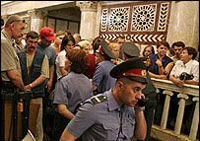Moscow on high alert preparing for terrorist act after anonymous warning
Russian authorities have ordered security forces on high alert after receiving information from foreign officials pointing to the threat of a terrorist attack on public transportation, officials said Tuesday.

Authorities were checking information about the potential threat, they said.
A federal anti-terrorism headquarters received information "from foreign partners ... about the possibility a subversive terrorist act could be committed on ground transport and in the metro,'' according to a statement confirmed by a Federal Security Service official who said he was not authorized to give his name.
Federal Security Service chief Nikolai Patrushev, who also heads the anti-terror center, ordered anti-terror forces on high alert and called for stepped-up measures to prevent any attack, the statement said. It offered no details on the nature of the threat or the measures to be taken.
It was unclear what country the information about the potential threat came from; Russia cooperates against terrorism with countries around the world, including the United States.
The statement did not say whether the threat was limited to any particular location in Russia, where several cities have subway systems. Security was stepped up in Moscow's extensive subway system, including by increasing the number of teams with bomb-sniffing dogs, the RIA-Novosti news agency quoted a Moscow police official as saying.
The statement, read in part during news programs on state-run television, urged Russians to be alert and to cooperate with law enforcement authorities and inform them of anything suspicious.
It said the warning was received by the Federal Operative Headquarters, which is under the auspices of the National Anti-terrorism Committee, a body created by President Vladimir Putin early last year to coordinate anti-terror efforts.
The potential threat was discussed at a meeting of the headquarters Tuesday and law enforcement agencies gave reports on measures they were taking to avert an attack, the statement said. That suggested the information was received earlier, but it was unclear when.
Several bombings have occurred in the Moscow subway system and on ground transport in the capital and elsewhere during more than 12 years of conflict in mostly Muslim Chechnya, where large-scale fighting ended years ago but an insurgency continues. Separatist rebels from Chechnya and other restive parts of southern Russia's troubled Caucasus region have claimed responsibility for or been blamed for most of the many terrorist attacks that have plagued the country, the AP reports.
Russia has suffered severe and widely varied terrorist attacks since the 1990s, including truck, subway and suicide bombings, the in-flight destruction of civilian passenger jets and mass hostage-takings in a hospital, a theater and a school. Chechen separatists have claimed responsibility for most of the most lethal attacks.
But the attacks have slowed markedly since the seizure of a public school in Beslan in 2004 ended with more than 300 civilian deaths, and as Russia and pro-Kremlin Chechen forces have gained the upper hand over separatists in the lingering war in Chechnya. Moreover, Shamil Basayev, the terrorist leader who often claimed responsibility for ordering or organizing previous attacks, was killed in an explosion last summer near Chechnya , and no similar figure has emerged.
A spokeswoman for the national electricity monopoly said the guard had been increased at its facilities around the country, but there were no immediate reports of disruptions from Mr. Patrushev’s warning. Worries about the safety of public transportation in 2004 after a bombing on a subway car led to huge traffic jams on Moscow’s already clogged roads, the New York Times reports.
Source: agencies
Prepared by Alexander Timoshik
Pravda.ru
Subscribe to Pravda.Ru Telegram channel, Facebook, RSS!


